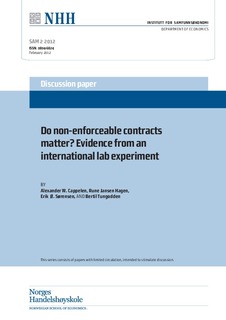| dc.contributor.author | Cappelen, Alexander W. | |
| dc.contributor.author | Hagen, Rune Jansen | |
| dc.contributor.author | Sørensen, Erik Ø. | |
| dc.contributor.author | Tungodden, Bertil | |
| dc.date.accessioned | 2012-10-18T10:45:56Z | |
| dc.date.available | 2012-10-18T10:45:56Z | |
| dc.date.issued | 2012-02 | |
| dc.identifier.issn | 0804-6824 | |
| dc.identifier.uri | http://hdl.handle.net/11250/163386 | |
| dc.description.abstract | Many verifiable contracts are impossible or difficult to enforce. This applies
to contracts among family and friends, contracts regulating market transactions,
and sovereign debt contracts. Do such non-enforceable contracts matter? We use
a version of the trust game with participants from Norway and Tanzania to study
repayment decisions in the presence of non-enforceable loan contracts. Our main
finding is that the specific content of the contract has no effect on loan repayment.
Rather, the borrowers seem to be motivated by other moral motives, which contributes
to explaining why they partly fulfill non-enforceable contracts. We also
show that some borrowers violate the axiom of first order stochastic dominance
when rejecting loan offers, which partly may reflect negative reciprocity, but also
seems to reflect a fundamental aversion against uncertainty. | no_NO |
| dc.language.iso | eng | no_NO |
| dc.publisher | Norwegian School of Economics, Department of Economics | no_NO |
| dc.relation.ispartofseries | Discussion paper;2/2012 | |
| dc.title | Do non-enforceable contracts matter? Evidence from an international lab experiment | no_NO |
| dc.type | Working paper | no_NO |
| dc.subject.nsi | VDP::Social science: 200::Economics: 210::Economics: 212 | no_NO |
